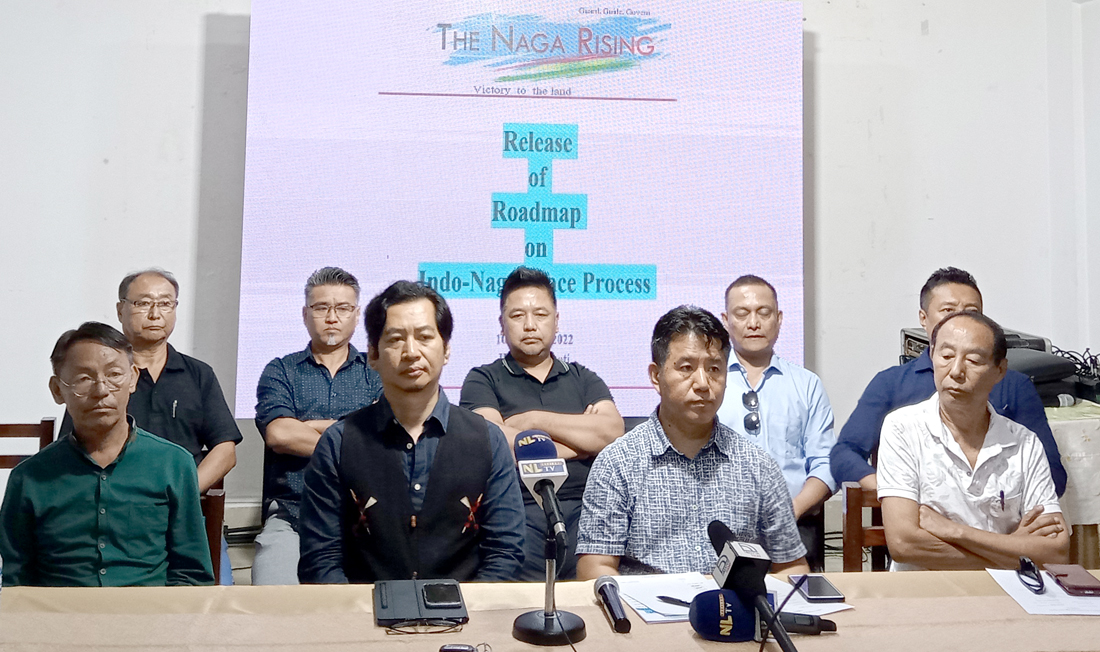TUESDAY, MAY 13, 2025
- Home
- The Naga Rising releases roadmap on the Indo-Naga political issue
The Naga Rising releases roadmap on the Indo-Naga political issue
Published on Aug 11, 2022
Share

Our Reporter
Dimapur, Aug. 10 (EMN): The Naga Rising (TNR) on Wednesday released a document with a roadmap on the Indo-Naga political issue to serve as a way forward in taking the process to its logical conclusion.
TNR’s roadmap to a peaceful, honourable and early solution was released at Hotel Saramati in Dimapur.
Convenor of TNR, Along Longkumer said that the roadmap is not an imposition or unilateral document to benefit only one side, party or faction but a unifying draft that can have a positive impact on the present peace process. He also conveyed that this initiative of TNR should be seen not as a contradiction but complementary to the resolve of the Naga public for early and inclusive solution.
Longkumer pointed out that the present generation is emerging from complex and difficult experiences with the Naga political movement on the one hand, the reality of Naga statehood on the other, the ceasefire in the 1960s and the present one, the peace process.
‘We are now confronted by the confusion and dilemma of dealing with two parallel agreements -- the 2015 Framework Agreement of the NSCN (IM) and the 2017 Agreed Position of the WC-NNPG -- which have further polarised the Nagas in the middle,’ he said.
Pondering on how to move forward with all these challenges, he said TNR seeks to find answers to some of these complex questions that have been inherited from the past and the immediate present.
“TNR has a common vision to work collectively looking beyond our tribal identity, the inherent conflicts surrounding us and the differences that we carry,” he added.
The journey for TNR, Longkumer said, is deeply rooted in the Naga people’s collective story of faith, freedom and fraternity.
'One of the inspirations and guiding lights of the TNR is the 1929 memorandum submitted to the Simon Commission. On our path, the TNR wants to renew this vision and give it a fresh narrative and direction that is in tune with the present context,’ he said.
According to TNR, the modern day challenges confronting the Naga people can only be resolved through a broad-based inclusive framework and through peaceful means.
To tackle the complexity of the present Naga situation, one of the primary problems that needs to be fixed is the unresolved Naga issue as it is something that requires “our collective priority, attention and unified action”.
‘TNR is, however, very clear and firm in our understanding that beyond making appeals for early solution or mobilising the masses, the prevailing situation also demands a decisive plan of combined action and strategy. Nagas by nature become too emotional and impulsive in a given situation. As a result we tend to lose our way in the confusion, exposing our isms and division,’ Longkumer noted.
Replying to queries about the Rising Peoples’ Party (RPP) and TNR ‘mixing’, he said the best catalyst to bring change is through politics, ‘although it has a different term in the state’.
On the involvement of the church in the Naga political issue, TNR secretary Khriezodilhou Yhome said that it firmly believes that the Church should provide leadership and the ‘role of the church is what people believe in’.
He said the TNR roadmap will be sent out to all the organisations in the Northeast region.
The three-point “Roadmap on the Indo-Naga peace process” based on the resolution passed at TNR annual meeting, June 29, 2022 are:
- To help supplement efforts of the Core Committee on Naga Political Issue comprising all 60 legislators of Nagaland, a community platform with representation of all shades and opinions should be formed through the initiative of the church.
- To work towards convergence of the Naga political groups as there will be only one solution to the Naga issue, as announced by the GoI.
- To help break the stalemate between the GoI and the NSCN (IM) on the unresolved issue of flag and constitution.

